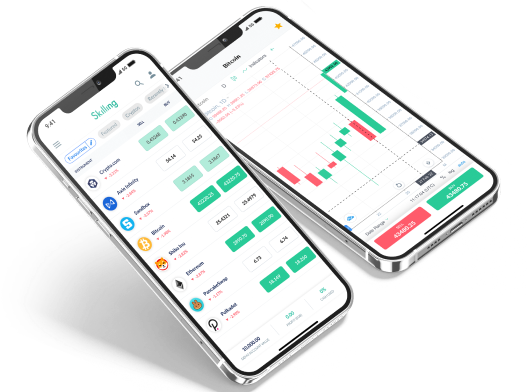Trade options are a fundamental part of the financial markets, offering traders a unique blend of flexibility, leverage, and risk management capabilities. This article aims to unravel the complexities of trade options, providing a clear understanding of their mechanics, practical strategies for trading them, a comparison with CFD trading, and answers to common questions. Whether you're a novice curious about options or an experienced trader looking to refine your strategies, this guide offers valuable information to get you into the world of trade options.
Experience Skilling's award-winning platform
Try out any of Skilling’s trading platforms on the device of your choice across web, android or iOS.

Trade options - how do they work?
Trade options are a type of derivative contract that grants the holder the right, but not the obligation, to buy (call option) or sell (put option) an underlying asset at a specified price (strike price) within a set time frame. The benefit of options lies in their versatility; they can be used for hedging, speculative trading, or income generation. The buyer pays a premium for the right to exercise the option at the strike price, while the seller receives this premium and agrees to fulfil the contract if the buyer chooses to exercise the option.
- Components of an option: An option contract consists of the underlying asset (stocks, commodities, indexes, etc.), the strike price, the expiration date, and the premium.
- Call Options: Buying a call option gives you the right to purchase the underlying asset at the strike price before the option expires. If the asset's price rises above the strike price, you can buy the asset at a discount or sell the option for a profit.
- Put Options: Conversely, buying a put option gives you the right to sell the underlying asset at the strike price. This is beneficial if the asset's price falls below the strike price, allowing you to sell it at a higher price or profit from the option itself.
- Option Premiums: The premium is the price paid for the option. It's influenced by various factors, including the underlying asset's price, time to expiration, volatility, and interest rates.
- Exercising Options: Exercising an option means executing the right to buy or sell the underlying asset. However, many traders choose to sell the option itself to realize profits without ever dealing with the underlying asset.
- Expiration: Options have a limited life. As the expiration date approaches, the time value of the option decreases, a phenomenon known as time decay.
Strategies for trading options
Trading options offer a range of strategies according to investment goals, risk levels, and market conditions. Here are some key strategies, expanded with more details:
- Covered call: This strategy involves holding a long position in an asset and selling a call option on the same asset. It's used to generate income from the option premium.
- Protective Put: Buying a put option for an asset you own. This strategy provides insurance against a significant drop in the asset's price.
- Iron Condor: This is a more advanced strategy that involves buying and selling calls and puts with different strike prices but the same expiration date. It's used when little movement is expected in the underlying asset.
- Straddle: Involves buying a call and put option with the same strike price and expiration date. It's a bet on volatility without predicting a specific direction.
CFD Trading vs Trade Options
While both CFDs (Contracts for Difference) and trade options are derivatives, they differ significantly:
- Ownership: Options give the right to buy or sell an asset, while CFDs are agreements to exchange the difference in the price of an asset from when the contract is opened to when it's closed.
- Risk and reward: Options have a known risk (the premium paid), whereas CFDs can have unlimited risk.
- Leverage: Both offer leverage, but they work differently. In options, leverage comes from the ability to control large amounts of assets for a small premium. In CFDs, it's through borrowing capital to increase trade size.
- Expiration: Options have an expiration date, while CFDs do not, unless stipulated by the trader.
What's your Trading Style?
No matter the playing field, knowing your style is the first step to success.

FAQs
1. What are the risks of trading options?
The main risk is the potential loss of the premium paid for the option if the market doesn't move in the anticipated direction.
2. Can options be used for hedging?
Yes, options are often used to hedge against potential losses in an existing investment.
3. How important is timing in options trading?
Very important. The value of options is heavily influenced by the time left until expiration.
4. Are trade options suitable for beginners?
Options can be complex and require a good understanding of the market and the specific product. Beginners should approach with caution and ideally gain experience first.











